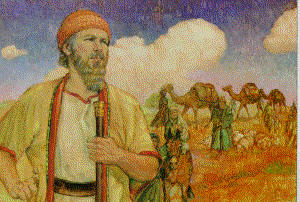The Torah: The Faith of Abraham
For an overview of what will be covered in this chapter, read Genesis 12–25.
Abraham is without question one of the outstanding individuals of the Old Testament. God spoke to him personally, visited him in his home and even considered him a friend. And Abraham loved God. He obeyed him, served him, and was even willing to sacrifice his son to prove his faith. Abraham is a biblical superhero, richly deserving a place in the Old Testament Hall of Fame. But are his experiences something you can personally relate to?
| Related articles:
The example of Abraham: a study of Romans 4, by Michael Morrison Abraham’s example of faith, a study of Hebrews 11:8-19 Abram, the real story, by J. Michael Feazell |
 |
| “By faith Abraham, when called to go to a place he would later receive as his inheritance, obeyed and went, even though he did not know where he was going” (Hebrews 11:8). |
Abraham may seem superhuman, but if we look more closely at some of the incidents in his life we’ll see someone like the rest of us, with many frailties and weaknesses. He eventually became someone who “believed the Lord, and he credited it to him as righteousness” (Genesis 15:6).
But Abraham wasn’t born that way. He had to grow and learn by experience. In Genesis 12, God told Abraham to uproot himself and his family from their familiar surroundings and move to a new land. It was a test of faith and obedience for a 75-year-old man. Abraham did as he was told. He went out, “even though he did not know where he was going” (Hebrews 11:8). On this occasion Abraham trusted God. But Abraham wasn’t perfect.
Read the rest of Genesis 12. Isn’t this a rather strange thing for a man of faith to have done? Abraham’s wife, Sarah, even at her age, was so attractive that other men were taken with her beauty. Abraham was concerned that some might even consider killing him so that Sarah would be available to marry. Fearing for his life, Abraham deceived Pharaoh into believing his beautiful wife was his sister.
Earlier, Abraham had trusted God. But in this chapter we see Abraham acting first in faith, and then in fear. Even though Abraham was a man of faith, he was an imperfect human.
Read the accounts of Abraham’s relationship with his nephew, Lot. Note how Abraham preferred peace to strife in the incident recorded in Genesis 13:5-12. Lot took advantage of his uncle’s desire for peace, and chose what he thought was the best territory. It was a decision that rebounded. Lot and his family settled in a disputed area and became caught up in local wars. In Genesis 14:12-16, Lot was taken prisoner, and we read how Abraham went to his rescue.
Abraham’s love of peace, mixed with loyalty and courage, is an impressive quality. He was indeed a man learning to live up to God’s standards. But he had not yet fully learned to trust in God.
God had made important promises to Abraham regarding his descendants. The problem was, Abraham didn’t yet have any descendants. Sarah was barren, and she and Abraham were well past the age they could expect to have children. In Genesis 15:1-3, Abraham explained this situation to God. But God insisted that eventually they would have a son who would inherit the promises.
Instead of waiting in faith, Abraham and Sarah took matters into their own hands (Genesis 16:1-4). Their impatience produced much unhappiness for Abraham, Sarah and her maid, Hagar. Hagar’s experiences are recorded in some detail in the Bible. They provide us with a touching example of God’s compassion and mercy for the oppressed (verses 5-16; 21:9-21). But we learn from this that God does not always spare us from the consequences of our lack of faith.
It is a lesson that is often repeated throughout the Bible. Although sin is forgiven, the physical consequences are often still felt. It was a lesson even Abraham had to learn the hard way. Abraham and Sarah had to wait many more years for their son and heir. Finally, when Abraham was 100 and Sarah 90 (Genesis 17:17), the time had come. The New Testament book of Hebrews tells us: “By faith Abraham, even though he was past age – and Sarah herself was barren – was enabled to become a father because he considered him faithful who had made the promise” (Hebrews 11:11).
So the final verdict was that Abraham and Sarah did wait in faith. But Genesis reminds us that their faith was mixed with a strong dose of human doubt and misgivings (Genesis 17:15-19; 18:10-15). Eventually a son, Isaac, was born to Abraham and Sarah (Genesis 21:1-3). Sometime later came the great test of Abraham’s life. God told him to travel to a distant mountain and offer Isaac as a sacrifice (Genesis 22:1-2).
 |
| “Abraham built an altar…and arranged the wood on it. He bound his son Isaac and laid him on the altar, on top of the wood. Then he reached out his hand and took the knife to slay his son. But the angel of the Lord called out to him from heaven, `Abraham! Abraham!… Do not lay a hand on the boy'” (Genesis 22:9-12). |
Put yourself in Abraham’s place. What conflicting emotions must have raged through his mind? Isaac was his long-promised heir. Why would God want him dead? Abraham had waited so long for a son, and now he would have to lose him.
On the other hand, Abraham reasoned that God could raise Isaac from the dead. Had God not caused Isaac to be born from parents who, in terms of childbearing potential, were as good as dead? God had said the promises were to be fulfilled through Isaac. Abraham trusted and relied on God. He believed that God knew what he was doing (Hebrews 11:17-19).
As Paul wrote in his epistle to the Romans: “Yet he did not waver through unbelief regarding the promise of God, but was strengthened in his faith and gave glory to God, being fully persuaded that God had power to do what he had promised” (Romans 4:20-21).
God intervened at the last moment: “Now I know that you fear God, because you have not withheld from me your son, your only son” (Genesis 22:12). And that is how we think of Abraham now – a great man of faith and courage who dedicated his life to seeking God’s will and fulfilling his purpose. But from the experiences recorded in the Bible, we can see that Abraham’s life was not one unbroken catalog of faith. There were ups and downs, moments of worry, doubt, indecision and frustration.
The faith chapter in Hebrews reminds us that “without faith it is impossible to please God, because anyone who comes to him must believe that he exists and that he rewards those who earnestly seek him” (Hebrews 11:6).
 |
| Grieved and tottering, Abraham leans on Isaac as father and son lay Sarah to rest: “Afterward Abraham buried his wife Sarah in the cave in the field of Machpelah near Mamre (which is at Hebron) in the land of Canaan” (Genesis 23:19). |
A life spent learning to obey God is like a journey, with a starting point, a route and a destination. For Abraham that journey began when he left his home to travel wherever God would lead him. He could not always know what route the journey would take. But he learned to trust in God to direct his steps.
Your journey may not be as eventful as Abraham’s, but you can be sure there will be tests and trials, ups and downs, successes and failures along the way. We can all be encouraged by these examples from the life of the father of the faithful.
One does not learn to live by faith all at once. It doesn’t come naturally. We must learn, and, as we learn, we make mistakes. But those mistakes need not cut us off from God. He is a patient, compassionate and merciful teacher.
Like all good teachers, he does not expect his students to fail. He will work with us, encourage us, and, yes, sometimes allow is to be tried and tested, “that your faith…may be proved genuine and may result in praise, glory and honor when Jesus Christ is revealed” (1 Peter 1:7). Indeed, God says, “My righteous one will live by faith. And if he shrinks back, I will not be pleased with him” (Hebrews 10:38).
But for those who do follow God in faith, there is the promise from Jesus Christ: “Never will I leave you; never will I forsake you” (Hebrews 13:5).

